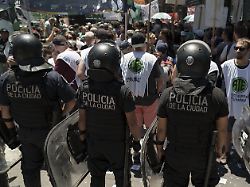New rules in Argentina
Milei wants money from demonstrators for police operations
December 23, 2023, 11:23 a.m
Argentina’s new president is ultra-libertarian. With him, the state should take a back seat and spend as little money as possible. An idea how he can save money: demonstrators pay for police operations themselves. This is what is supposed to happen after protests against Milei.
The organizers of the first protest against the government of the new Argentine President Javier Milei have to pay the equivalent of tens of thousands of euros for the police operation. Government spokesman Manuel Adorni said on Friday that the massive deployment of police, federal police and paramilitaries had cost 60 million pesos (almost 68,000 euros). “The bill will be sent to the social movements,” said Adorni. They would have to bear the costs “that should not be imposed on the citizens.”
Thousands of people took part in the demonstration on Wednesday to protest against the austerity measures of the ultra-liberal right-wing populist Milei. They also commemorated the deadly protests in 2001 that followed the country’s economic collapse.
The organizers of the protests criticized the large presence of security forces as an attempt at provocation. “This reminds me of the dictatorship” from 1976 to 1983, said Eduardo Belliboni, leader of the left-wing Polo Obrero movement.
Anyone who blocks roads could lose social benefits
Milei’s government has said it will crack down on hundreds of traffic-blocking demonstrations a year in the capital Buenos Aires and has threatened to withdraw welfare benefits from participants who block roads.
Milei, who was elected in November, promised “shock therapy” for heavily indebted Argentina when he took office on December 10th. The 53-year-old political newcomer took over Latin America’s third-largest economy in the midst of a severe economic crisis. Inflation has risen to more than 160 percent and more than 40 percent of the population lives in poverty.
